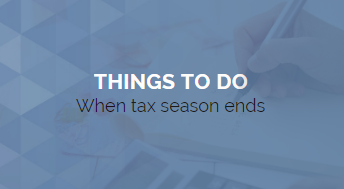
Believe it or not, the months following April 15th are actually the best time to jump back into things and start preparing for the next tax year. As your finalized tax return is fresh and still on your mind, individuals and businesses should consider the following five tips for 2019 to ensure a less stressful tax season in 2020.
Were you the frazzled taxpayer dropping off information on April 14th or 15th? Did you find yourself changing around personal plans to pick up your return at the last possible minute? If you said yes, your accountant was equally stressed!
Things happen and K-1s do come in late, but what can help make for a smoother 2019 tax filing season is to start organizing your records early. Did you know if you have the majority of your information and documents gathered, you could drop it off early while missing information is still being prepared? Keep this in mind next February and you’ll already be one step ahead.
When starting a new job or opening an account you often are asked to complete a Form W-4. This W-4 is used by the employer/payer to withhold an appropriate amount of tax based on a recipient’s tax filing status and their allowances claimed.
When you submit your completed form, it is typically not questioned and your payments are processed accordingly. Unfortunately, if you complete your W-4 incorrectly, you will not know until after you prepare and file your tax return. Taxpayers can use their pay stub to project their tax bill/refund at the end of the year, however, if your income fluctuates it may be difficult to know for sure.
If your tax return results were not ideal this year, you may want to revisit your W-4 to see if changes are needed. Our sister company, Abacus Payroll Inc., has a W-4 assistant that can help you complete the W-4 or you could always schedule a tax planning meeting with your accountant and advisor.
If withholding does not cover your supplemental income or you own a business, you may want to consider paying in quarterly tax estimates. Like withholding, this is tax paid during the year that will be applied to your tax return. These payments are due quarterly (in January, April, June, and September) and can vary depending on your income.
If you are a self-employed individual that is not on payroll, you will likely need to make estimated tax payments to avoid penalties when you have tax due. These payments are often calculated based on prior year tax or can use projections on current year to calculate payments.
Every business needs an efficient accounting system and controls. With new technology, business owners have the ability to simplify the accounting process to better leverage their time and focus on more important objectives.
New accounting systems or add-on applications can be utilized to shave time off of tedious tasks such as bank reconciliations, which in turn will enable automation for a portion of the process. Using this technology may assist you in having a real-time idea of where you stand during the year and can also help with more accurate tax projections.
If you uncovered a mistake on your tax return after filing, you have the option to file an amended return. Typically you only file an amended return if you forgot to report something or if there was a large mistake.
A minor mistake may be corrected by the taxing authorities automatically when their system matches the tax forms received to your tax return. This could happen if you forgot about an old W-2 or 1099 form. In this instance, you will receive an automatic notice saying that changes were made to your return and will provide the next steps for you to take. If you agree with the correction, an amended tax return wouldn’t be necessary. If the adjustment is incorrect, however, a response to the adjustment is needed in order to correct the return.
It is never too early to start planning for the 2019 tax filing season. When considering the items discussed, it is even more important to coordinate with an Alloy Silverstein team member to assist you in making the appropriate changes.

Manager & Director of Cloud Services
Chris provides accounting, tax planning, and consulting services to professional athletes, family entertainment centers, and other businesses in the amusement and hospitality industry. He also aids clients in implementing cloud accounting solutions.
View Chris's Bio → Follow @AthleteCPA on Twitter →